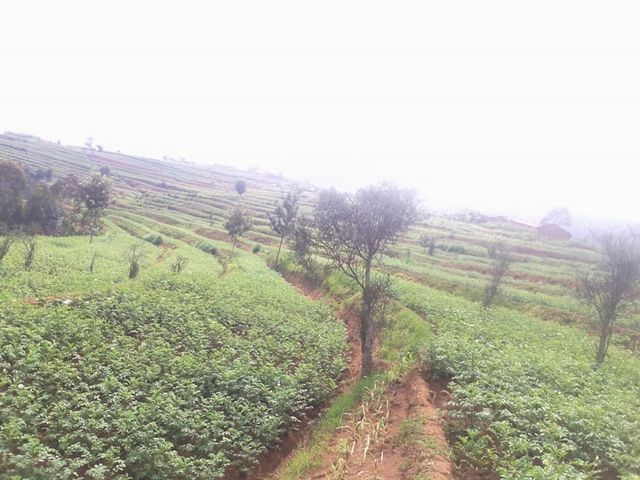As per Harerimana Innocent, the president of KOABI Rusenge Cooperative in Nyaruguru district, the SMART project transformed farmers’ traditional farming into sustainable agricultural practices.
«The created assets, including the rehabilitated marshland, radical terraces, drying shed constructed, and seeds conditioning facilities, enable farmers to increase productivity. This was strengthened by capacity building of farmers in good agricultural practices and postharvest handling and storage through training. We expect many opportunities in the future to have more yield per hectare to increase income through farmer-market linkage. All those interventions make us feel confident that we will be able to manage shocks and stresses that used to impend our farming activities», said Harerimana Innocent.
Indeed, Harerimana added that farmers used to face a shortage of Irish potato seeds. Still, with the created assets like a seeds conditioning facility, a greenhouse, and skills earned through training, farmers are sure that Irish potato production will be improved in the Rusenge sector as well as in the Nyaruguru district.
On the other hand, Mukagasana Therese, a farmer from Karugazo, confirmed that farmers are very blessed to have a project like SMART! “Before SMART interventions, we used to grow traditionally. We practiced the intercropping method, and the lack of improved farming methods resulted in poor production. Since the SMART project started, we have experienced positive impacts, such as increased production from 15Mt/ha to 25Mt/ha. We got fodder for our livestock, and we are linked to formal markets”, she stated.
The SMART project provided sustainable and long-term solutions such as land protection against erosion, fodder for livestock, market linkage, and Irish potato seed multiplication, giving many opportunities to earn more income.
The United Nations World Food Programme (WFP) and the government of the Republic of Korea through the Korea International Cooperation Agency (KOICA) launched the “Sustainable Market Alliance and Assets Creation for Resilient Communities and Gender Transformation (SMART) Project” in Rwanda.
The SMART project builds on best practices from Korea’s rural development model, the Government of Rwanda’s Vision Umurenge Programme (VUP), and WFP’s asset creation and smallholder farmer market support model to improve household food security and enhance community resilience. The project is aligned with the Government of Rwanda’s National Strategy for Transformation (NST, 2017–2024). It also aligns with the Ministry of Agriculture and Animal Resource’s (MINAGRI) Strategic Plan for Agriculture Transformation 2018 – 2024 as well as the Social Protection Sector Strategic Plan 2018/2019 -2023/2024.
The SMART project implementation is carried out by RWARRI and RDO.
